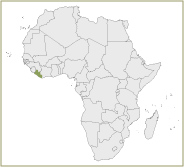Government, donor and civil society representatives from over 40 countries recently gathered in Monrovia, the capital of post-conflict Liberia, to discuss how donors can support peacebuilding and statebuilding in conflict–affected and fragile states.
As part of the second ‘International Dialogue on Peacebuilding and Statebuilding', attendees representing developed and developing countries considered how to build sustainable peace and develop capable and accountable states during the two day event which took place on the 15-16 June.
The Liberian Minister for Planning and Economic Affairs, Amara Konneh, described the event as an opportunity for countries like his own to plan their journey from “fragility to agility”. Liberia is still recovering from a series of brutal civil wars that ended in 2003.
In preparation for the event, four working groups were established made up of members from development agencies and developing countries to draft recommendations in four key areas: political dialogue, strategic planning, innovative aid instruments and external assistance to capacity development.
At the close of the International Dialogue, attendees signed off on a “Monrovia Roadmap” that sets out five overall peacebuilding and statebuilding objectives:
- Legitimate politics – Foster inclusive political settlements and conflict resolution
- Security- Establish and strengthen people’s security
- Justice – Address injustices and increase people’s access to justice
- Economic Foundations – Generate employment and improve livelihoods
- Revenues and services – Manage revenues and build capacity for accountable and fair social service delivery
The International Dialogue plans to pursue its unique position in bringing together fragile and conflict-affected countries and international partners after November’s high-level meeting on Aid Effectiveness in Busan, Korea. After which it will also seek to assess progress on the implementation of the five key objectives and to share knowledge and experiences.
The European Union is working in a multitude of countries that are in conflict and severe crisis, or in situations that are emerging out of instability and in search of a path towards development and sustainability and has a lot to contribute to this learning. See, for example, the article and video on a recently held Technical Cooperation learning event in Guinea. Or a previous article on donors’ efforts to tackle long-term development needs in fragile or post-conflict situations.
The International Dialogue is chaired by East Timor and the UK and brings together the members of the International Network on Conflict and Fragility and the G7+ group of fragile states, which was established in 2008 and includes: Afghanistan, Burundi, Central African Republic, Chad, Côte d’Ivoire, the Democratic Republic of Congo, East Timor, Haiti, Liberia, Nepal, the Solomon Islands, Sierra Leone and Southern Sudan.
The essence of the International Dialogue was summarised by Olivier Kamitatu, Minister of Planning from the Democratic Republic of Congo: “The G7+ is extremely useful in giving us a common voice in international discussions, but it’s a club we’d like to leave as quickly as possible.”
Preparing for Busan
The International Dialogue also agreed to present at the forthcoming High-Level meeting on Aid Effectiveness in Busan a set of commitments to improve aid effectiveness and development outcomes in fragile states based on a set of working group recommendations and a draft action plan that were submitted at Monrovia. A core group of International Dialogue members will prepare these commitments for which a set of key components were proposed that reflect current thinking and good practice on capacity development:
- Assessments of the causes and features of fragility and sources of resilience for the development of national strategies and plans need to be nationally-led.
- Increased space, leadership and support for inclusive political dialogue needs to be given to develop a broadly owned shared national vision.
- Government and its international partners need to find a country-level agreement to define joint priorities, measures of progress and ways to manage risks based on consultations with national stakeholders.
- International assistance to fragile states needs to be delivered along a new deal that generates results that are aligned with peacebuilding and statebuilding objectives and that strengthens (rather than duplicates) national and local capacities and institutions.


(1)
Log in with your EU Login account to post or comment on the platform.
The African Development Bank will be organising an Africa-focused event on 8-10 September in Addis Abba so-as to reach a common Africa position that can be taken to Busan. The focus of the meeting will be on peace and statebuilding. More information can be received by contacting the EU Delegation to the African Union (P&S Section).